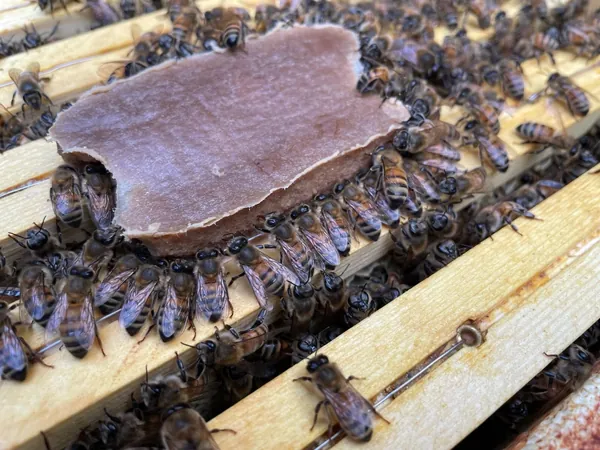
Revolutionary Food for Honey Bees: A Game Changer for Pollination and Survival!
2025-04-16
Author: Noah
A Breakthrough for Honey Bees' Nutrition
Scientists have introduced a groundbreaking artificial food source that could help sustain honey bee populations without reliance on natural pollen. This innovation promises to be a vital lifeline amidst the ongoing crisis of colony collapse.
Promising Research Findings
Published in the prestigious journal *Proceedings of the Royal Society B*, the research conducted by Washington State University in collaboration with APIX Biosciences NV showcases successful trials in which nutritionally stressed bee colonies thrived on this new diet. This artificial food, akin to human "Power Bars," contains all the essential nutrients needed by honey bees.
Combatting Colony Collapse
As bee populations face unprecedented threats from urban development, climate change, and diminishing food sources, this new diet aims to curb the alarming rates of colony collapse, safeguarding the essential role bees play in global food production.
How It Works
The innovative food source is placed directly into hives, where young bees can process and share the nutrients with both larvae and adult bees. This ensures that the colony receives a balanced diet, irrespective of the reduction in natural pollen availability.
Experts Weigh In
Brandon Hopkins, a distinguished professor at WSU, notes the critical need for variety in bees' diets, which has become increasingly hard to achieve due to modern agricultural practices. Dr. Patrick Pilkington, CEO of APIX Biosciences, emphasizes that this development marks the first time honey bees can be nourished entirely through a synthetic feed.
A Collaborative Effort
This research is the culmination of over a decade of collaboration among three teams: the pioneering scientists at APIX, the expertise of the WSU researchers, and experienced beekeepers in California who facilitated extensive field testing.
Key Discovery: Isofucosterol's Role
A major finding of the study is the identification of isofucosterol—a molecule found in pollen that is crucial for bee health. Colonies fed this enriched diet were able to survive an entire season without access to natural pollen, highlighting its significance.
Real-World Testing Success
Field trials conducted in blueberry and sunflower patches revealed that colonies given the novel food flourished compared to those on standard feeds. This is particularly important as many beekeepers have stopped pollinating blueberries due to low survival rates among their bees.
The Future for Beekeepers and Growers
With plans for the product to be available for purchase in the U.S. by mid-2026, optimism is high regarding its potential to impact beekeeping and agriculture positively. The researchers are actively collaborating with the beekeeping community to maximize the benefits of this innovative feeding strategy.
A Glimmer of Hope
Given the alarming rates of colony mortality, this innovative food source presents a critical opportunity to revitalize honey bee populations. Will it be the game changer needed to protect these essential pollinators and by extension, global food security?









 Brasil (PT)
Brasil (PT)
 Canada (EN)
Canada (EN)
 Chile (ES)
Chile (ES)
 Česko (CS)
Česko (CS)
 대한민국 (KO)
대한민국 (KO)
 España (ES)
España (ES)
 France (FR)
France (FR)
 Hong Kong (EN)
Hong Kong (EN)
 Italia (IT)
Italia (IT)
 日本 (JA)
日本 (JA)
 Magyarország (HU)
Magyarország (HU)
 Norge (NO)
Norge (NO)
 Polska (PL)
Polska (PL)
 Schweiz (DE)
Schweiz (DE)
 Singapore (EN)
Singapore (EN)
 Sverige (SV)
Sverige (SV)
 Suomi (FI)
Suomi (FI)
 Türkiye (TR)
Türkiye (TR)
 الإمارات العربية المتحدة (AR)
الإمارات العربية المتحدة (AR)